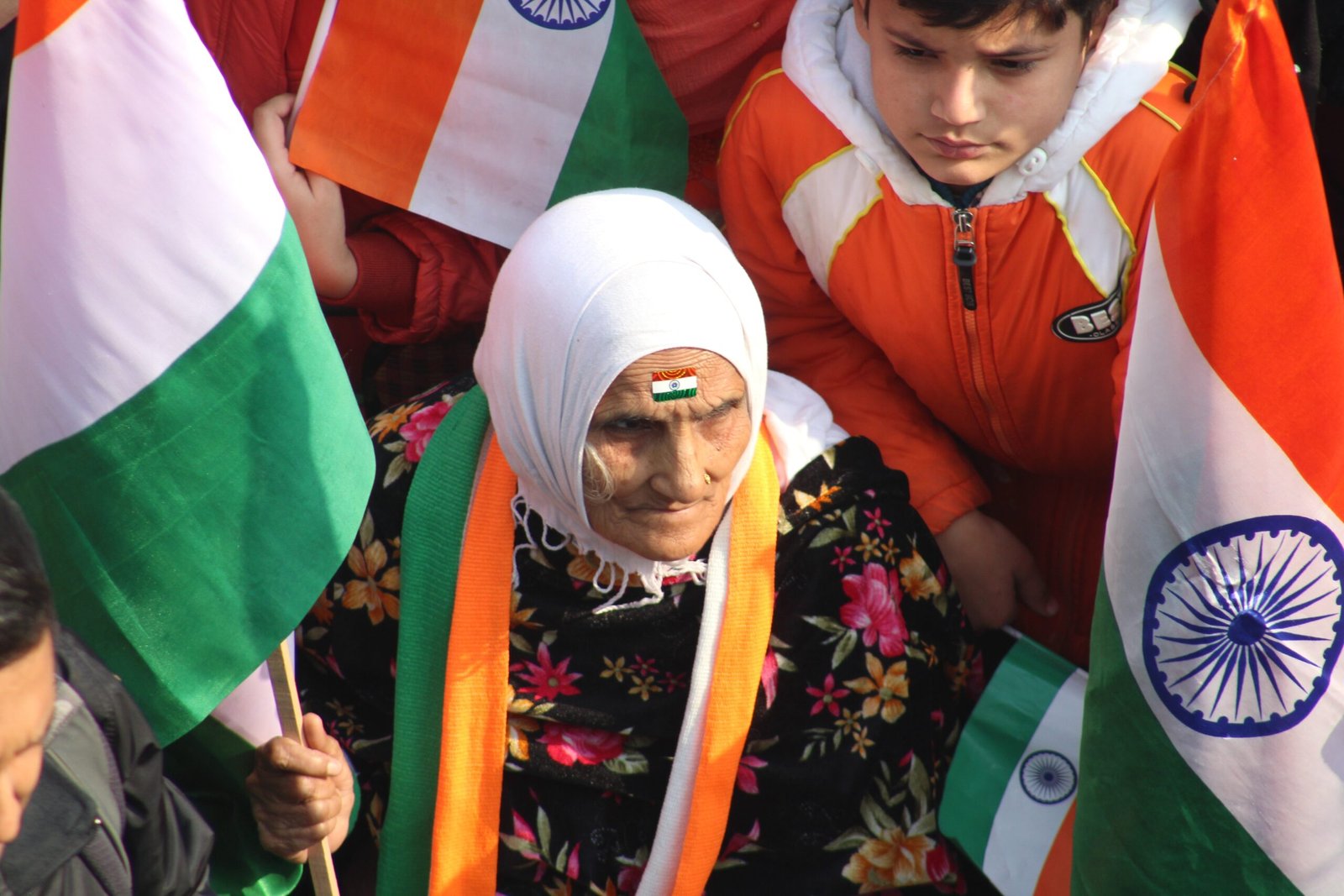Mridula’s thirtieth birthday was still some days away when she found, to her utter dismay, several grey strands near the front parting. She had been proud of her slightly curly, black tresses; her hair was not too long but made up for the lapse through sheer volume. Her braid has always been a thick one and amateur hairdressers among relatives and friends often tried their innovative knots on her whenever occasion permitted.
In the past she had always nipped the stray wiry grey strands in the bud by pulling them out from the very roots, but looking at the current crop, her heart sank. She knew it ran in her family — her grandmother, her aunts — all had greyed prematurely, but she had hoped that at least, for once, the genes on her mother’s side would predominate. Mridula let out a heavy sigh; evidently, genes were only great in passing on diseases and disorders.
Initially, Mridula considered applying her grandmother’s remedies to tackle her premature greying – extracting the juice of hibiscus flowers and boiling the liquid in an iron pot along with amla and coconut oil. The resultant sticky concoction had to be applied on the hair and scalp and left overnight. But it was a messy and difficult beauty regimen to follow for a working woman with a toddler. The only time she could apply the concoction was on Saturday night but on Sunday morning a steady stream of visitors would arrive and she found it deeply embarrassing when she had to appear in the living room with the oily hair sticking to her scalp. Next, she tried henna, but after several days as the grey strands multiplied, they took the shade of deep mahogany. But it only increased Mridula’s consternation. Looking at the mirror she was reminded of the Maulvi Sahib residing in the neighbourhood of her childhood home. The soft-spoken, pan-chewing gentleman followed the etiquette to the ‘T’ but his deep crimson hued hair and beard made him an object of abject terror to little Mridula. The childhood memory prompted her to ditch the henna as well.
Hair colours were the next best option but after a month or so her entire scalp was covered with tiny red rashes. A visit to the dermatologist confirmed that Mridula was allergic to a key component in hair dyes and hence changing brands would not do any good. Her dreams to turn once again into a raven-haired beauty were dashed and Mridula consoled herself thinking greying was better than going bald. In desperation, she decided to embrace her grey tresses boldly and wear them in a short style, emulating Nafisa Ali. She just never thought it could be such a hair raising experience.

The grey strands multiplied rapidly; her husband was a sport though. He claimed that it made him look younger. But Mridula gave up on wearing white sarees, though they had been among her favourites, after a salesman addressed her as “Aunty” while calling her husband, “Bhaiya.” Her embarrassed mother-in-law, who still had more black than grey hair, often tried to attribute her premature greying to hormonal imbalance caused by the pregnancy. But friends, neighbours and even complete strangers were not so understanding.
Mridula tried to take it all in her stride, even when people openly stared at her, trying to figure out her age. She still received appreciative glances from men, though mostly from those in their fifties and sixties instead of her own age group. But she was irked when people assumed that her grey hair was symptomatic of some undiagnosed malady and freely imparted advice, medical and otherwise.
Some tried to be discreet. Once, while she was buying chocolates for a friend’s son, the overtly friendly shop owner pointedly said: “These days you get so many brands – Godrej…” Mridula was about to enquire whether Godrej had recently launched chocolates when she realised, he was tactfully suggesting that she should apply hair dye available in the market.
Often, people would give her a look of pity and sympathy, generally reserved for the sick and terminally ill. Even policemen, not known to extend a helping hand readily to the public were unusually forthcoming with sage advice.
“Madam! Baba Ramdev says if you constantly rub your fingernails together, all your hair problems will disappear and you will retain your black hair even when you turn eighty,” said the traffic sergeant with a smugness as she stood impatiently on the median to cross the street. Gritting her teeth, she was tempted to retort but thankfully, the traffic lights turned red.
In the next three years, her hair turned a nice mix of salt and pepper but Mridula failed to hone out the perfect reply to the stupid but oft-repeated query, “Why is your hair turning grey at this tender age?”
She tried a host of strategies – from silly grins, embarrassing silences to turning a deaf ear – but nothing was effective against curious and inquisitive souls who made her hair their business.
She once even thought of blurting out “Progeria” after watching the Amitabh Bacchan starrer “Paa” but then held her tongue, unsure that they would see any humour in her remark. Her explanation that it was hereditary was not bought by many. Once, a shop assistant enquired whether it was a liver ailment that led to the premature greying. When she contradicted him, saying it was a hereditary trait he gave her a sullen look and mumbled within earshot, “Grey hairs are symptomatic of a bad liver!” Having failed to convince him that her liver, heart, kidney and all other vital organs were perfectly fine, Mridula decided never to go back there, although she had been a frequent customer to the establishment.
In the meantime, her neighbour, Mrs Bose, who was at least 10 years older than Mridula, decided to take advantage of the circumstances. She suddenly started addressing Mridula as “Didi” despite having a college-going kid. It did not matter that the white roots of her otherwise unnaturally black tresses, which surfaced every fortnight, gave the game away.
However, Mridula was far more concerned about her four-year-old daughter Mithi who was in kindergarten. Once, on the occasion of grandparents’ day, the teacher had created a family tree. Mridula felt as if somebody had twisted a knife into her gut when she saw that the cut-outs of the grandparents had white cotton pasted on the top of the head to denote grey hair while black wool was glued on those of the parents. She could not help but wonder whether Mithi would be confused since the reality was different in her case. Mridula knew kids could be cruel and she hoped Mithi would not be subjected to any kind of teasing because of her ‘aged’ mother.
But the incident that broke her heart occurred outside school. Mridula had taken Mithi to a cafe for a treat after buying books and uniforms for her new school. As she carried their food tray back to their table, she realised a family of three seated next to them were discussing her without making any attempt to lower their voices. “The daughter is definitely adopted. Look at their age difference!” the mother proclaimed loudly.
“She might have opted for surrogacy. Lots of working couples go for surrogacy these days, especially if they marry late,” piped up her daughter whose thoughts clearly ran to the wilder side. The father who tried to ineffectually hush them up, intervened, “No, no, you are wrong. She is not that old. Look at her! Her hair is grey but her skin is absolutely blemish-free, not a single wrinkle or even a bit of sagging. And she is definitely related to the little girl. They have the same smile.”
The burger tasted like ash in her mouth. She stole a look at Mithi. The little girl was busy playing with the toy that had come with her ‘kid-special’ lunch box. Usually, Mridula would have laughed over what she had overheard but their gossip fed her insecurities. Will her daughter pay the price for not conforming to expectations? Would she be labelled as the daughter of a “freak” by the judgemental society that they were part of? Mridula dropped the idea of indulging in window shopping and returned home, her despondency increasing with every step she took. Finally home, she abandoned her dupatta and sling bag on the table and stretched out on the sofa. She was miserable. Mithi promptly slung the bag on her shoulder. Like every daughter, she just loved to dig into her mother’s purse. Usually, Mridula would yell at her to leave her bag alone. But today she was not in the mood for Mithi’s tantrums. Suddenly Mithi said “Mummy! Look at me!” Her little girl had donned Mridula’s heels, dupatta and sling bag along with her shades. She had patted talcum powder on her front locks. “Don’t I look just like you with my grey hairs?” Mithi asked. Mridula’s heart suddenly felt lighter. With a wide smile, she nodded her head and asked, “Should I take a photograph?” As Mithi happily posed, Mridula basked in the best compliment she had been paid after a long, long time. Finally, she could sit back and enjoy greying — the first signs of wisdom.

By Anindita Chowdhury
Anindita Chowdhury is a special correspondent of the English daily, The Statesman. She is based in Hyderabad. Apart from reporting, she writes short stories and essays with special focus on history, particularly the social and cultural aspects of the bygone era. She can be contacted at aninditasmail@gmail.com














